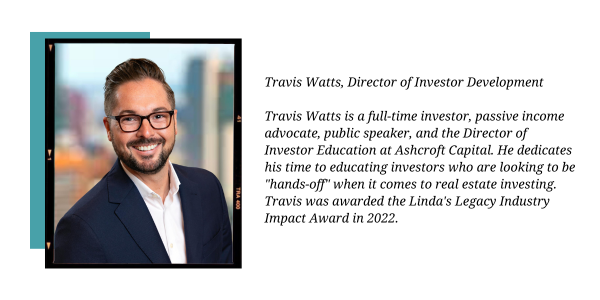May 16, 2023
By: Travis Watts, Director of Investor Development
Deciding how to invest your money can be difficult. We live in an era with access to limitless information at our fingertips. While more information and data help to create transparency, it doesn’t make the decision process less overwhelming or prevent analysis paralysis from occurring. Human beings are emotional by nature, and making important decisions about your wealth can be difficult if you aren’t able to properly recognize and manage your emotions during the decision-making process. The problem arises when emotions cloud your judgment; thus, leading to poor decisions.
A study by MagnifyMoney[1] identifies common emotional mistakes that many investors make:
- 66 percent of investors have made an impulsive or emotionally-charged decision they later regretted.
- 47 percent report difficulty keeping emotions out of investing decisions.
- 37 percent of investors have lost sleep worrying about the stock market.
- 30 percent have cried over investing.
The good news is that there are ways to avoid these mistakes!
As an investor, when it comes to making decisions about your money, you must be careful. Many investors don’t place a large emphasis on the time spent researching their investments. It’s not uncommon to get excited, busy, or want to start immediately.
The problem is that 66 percent of investors make an impulsive or emotionally driven decision that they later regret.
Separating emotions, like fear, greed, frustration, or impatience from investments can significantly help. One reason I like investing in private real estate is because it gives me time to make a well-informed decision. When you get a property under contract, you usually have 30-90 days to perform proper due diligence and make your final investment decision. As an investor looking at a private real estate placement, you could have days, weeks, months, or even the latter part of a year to make the investment decision. Having this additional flexibility allows you time to ponder, lessening the chances of falling prey to FOMO (fear of missing out).
How do you keep emotion out of investing?
It’s a question that many of us ask ourselves when we’re trying to make smart investment decisions. Additionally, 47 percent of investors report that it is difficult to keep their emotions out of investing. We want to make the right call, and we also want to feel good about our decisions.[2] The fact is, there is no way to remove emotion from investing completely, but there are some things we can do to keep them in check.
#1 We can create a plan and stick to it.
#2 We can diversify our portfolio.
#3 We can dollar cost average (investing a reoccurring fixed dollar amount).
This can be a good discipline strategy for long-term investors. It can help remove emotions by acknowledging that markets will sometimes be up, and sometimes be down. Either way, you will be investing year over year. There is peace of mind knowing that over the long run, you will have an averaged-out return, rather than trying to time the market (a difficulty for most investors).
#4 Understanding your risk tolerance and what is comfortable for YOU is perhaps the most helpful tool.
Investing involves taking calculated risks. Figuring out what types of investments make sense for you, which ones align with your risk tolerance, will provide a greater peace of mind.
If you are part of the 37 percent of investors who have lost sleep over the stock market, just know that you’re not alone.[3] That is a large percentage!
It can be easy to get caught up in the moment when it comes to the stock market. There are constant data metrics, daily news headlines flashing in front of us, and the public markets move quickly. Just remember, there is much more you can invest in aside from the stock market.
Looking at long-term historical data when considering an asset class can also be helpful. Stocks are just one asset class; real estate is another.
If we use real estate for a quick example, consider the median home price in 1990 in America. It was around $123,900. Fast forward to 2022, and it was $440,300.[4] Even though there have been ups and downs in the market along the way, the long-term trajectory has shown strong growth and stability.
Investing may be simple, but it’s not easy
It is a process like anything else, and the learning curve can be steep; therefore, it’s no surprise that 30 percent of investors have cried over investing. According to the MagnifyMoney survey, the top “reasons for tears” include losing money in the stock market (43%), feeling overwhelmed (36%), and selling too early (34%).[5]
A quick word of encouragement
The journey is worth it, and you might find that it’s not about investing at all. You’re learning to take control of your finances, which can be incredibly empowering. To me, this is about having a life by design instead of letting life happen.
On a final note
Emotions and logic are not mutually exclusive. Emotions play a critical role in how we make investment decisions. Knowing how to compartmentalize and control your emotions can make all the difference.
To Your Success,
Travis
Ashcroft’s Real Estate Fund
Real estate funds like the Ashcroft Value-Add Fund III (AVAF3) differ from single-asset syndications by investing in multiple properties, which creates a diversified return to investors.
AVAF3 is a real estate private placement currently open to accredited investors who are interested in diversifying into multifamily real estate. AVAF3 is targeting 6-10 multifamily properties throughout the Sunbelt region with an anticipated hold period of 5-7 years. Investors can invest in Class A and/or Class B Limited Partnership Interests.
Class A shares offer a 9 percent annualized coupon (preferred return), for investors seeking strong projected cash flow while reducing risk. Class A shares have limited equity upside beyond the 9% coupon in exchange for higher cash flow. Class B shares offer a 7 percent annualized coupon and offers a greater overall potential return with participation in the potential equity upside when properties sell or refinance.
To learn more about investing in multifamily apartments or to review projections, track record and FAQs, please visit AVAF3.com or schedule a call with our Investor Relations Team at investorrelations@ashcroftcapital.com.
Sources:
- 66% of Investors Regret Impulsive or Emotional Investing Decisions, While 32% Admit Trading While Drunk, magnifymoney.com™. (n.d.). Retrieved February 7, 2023, from https://www.magnifymoney.com/news/emotional-investing/
- Ibid.
- Ibid.
- 2022 Investor Benchmark Survey, Crowdstreet, 2022. 2021 Global Wealth Report by Credit Suisse. 2017 Millionaires Survey, Fidelity Investments.
- 66% of Investors Regret Impulsive or Emotional Investing Decisions, While 32% Admit Trading While Drunk, magnifymoney.com™. (n.d.). Retrieved February 7, 2023, from https://www.magnifymoney.com/news/emotional-investing/



